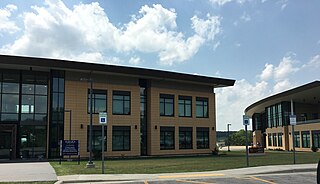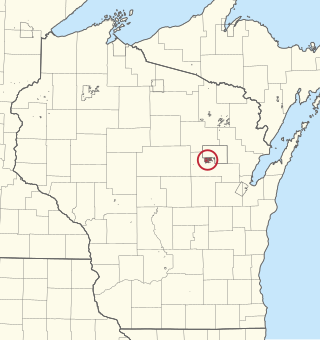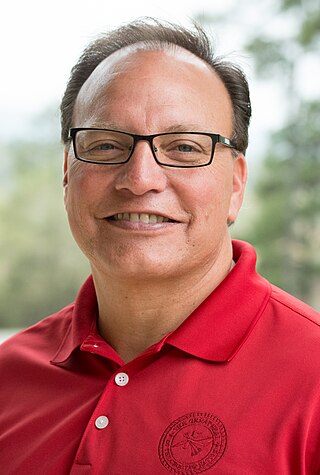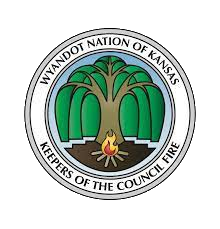
Native American gaming comprises casinos, bingo halls, slots halls and other gambling operations on Indian reservations or other tribal lands in the United States. Because these areas have tribal sovereignty, states have limited ability to forbid gambling there, as codified by the Indian Gaming Regulatory Act of 1988. As of 2011, there were 460 gambling operations run by 240 tribes, with a total annual revenue of $27 billion.

Kansas City is the third-most populous city in the U.S. state of Kansas, and the county seat of Wyandotte County. It is an inner suburb of the older and more populous Kansas City, Missouri, after which it is named. As of the 2020 census, the population of the city was 156,607, making it one of four principal cities in the Kansas City metropolitan area. It is situated at Kaw Point, the junction of the Missouri and Kansas rivers. It is part of a consolidated city-county government known as the "Unified Government". It is the location of the University of Kansas Medical Center and Kansas City Kansas Community College.

The Wyandotte Nation is a federally recognized Native American tribe headquartered in northeastern Oklahoma. They are descendants of the Wendat Confederacy and Native Americans with territory near Georgian Bay and Lake Huron. Under pressure from Haudenosaunee and other tribes, then from European settlers and the United States government, the tribe gradually moved south and west to Michigan, Ohio, Kansas, and finally Oklahoma in the United States.

Kansas Speedway is a 1.500-mile (2.414 km) tri-oval intermediate speedway in Kansas City, Kansas. The track, since its inaugural season of racing in 2001, has hosted a variety of racing series, including NASCAR, IndyCar, and the IMSA SportsCar Championship. The track has been owned by NASCAR since 2019, with Patrick Warren serving as the track's president. The track is served by the concurrent Interstate 70, U.S. Route 24, and U.S. Route 40, along with Interstate 435.

The Osage Nation is a Midwestern American tribe of the Great Plains. The tribe developed in the Ohio and Mississippi river valleys around 700 B.C. along with other groups of its language family. They migrated west after the 17th century, settling near the confluence of the Missouri and Mississippi rivers, as a result of Iroquois expansion into the Ohio Country in the aftermath of the Beaver Wars.

The Oneida Indian Nation (OIN) or Oneida Nation is a federally recognized tribe of Oneida people in the United States. The tribe is headquartered in Verona, New York, where the tribe originated and held territory prior to European colonialism, and continues to hold territory today. They are Iroquoian-speaking people, and one of the Five Nations of the Iroquois Confederacy, or Haudenosaunee. The Oneida are known as "America's first allies" as they were the first, and one of the few, Iroquois nations to support the American cause. Three other federally recognized Oneida tribes operate in locations where they migrated or were removed to during and after the American Revolutionary War: one in Wisconsin in the United States, and two in Ontario, Canada.

Eliza Burton "Lyda" Conley was a Wyandot Native American and an American lawyer. She was the first woman admitted to the Kansas Bar Association. She was notable for her campaign to prevent the sale and development of the Huron Cemetery in Kansas City, now known as the Wyandot National Burying Ground. She challenged the government in court, and in 1909 she was the first Native American woman admitted to argue a case before the Supreme Court of the United States.

The Stockbridge–Munsee Community, also known as the Mohican Nation Stockbridge–Munsee Band, is a federally recognized Native American tribe formed in the late eighteenth century from communities of so-called "praying Indians", descended from Christianized members of two distinct groups: Mohican and Wappinger from the praying town of Stockbridge, Massachusetts, and Munsee (Lenape), from the area where present-day New York, Pennsylvania and New Jersey meet. Their land-base, the Stockbridge–Munsee Indian Reservation, consists of a checkerboard of 24.03 square miles (62.2 km2) in the towns of Bartelme and Red Springs in Shawano County, Wisconsin. Among their enterprises is the North Star Mohican Resort and Casino.
The Buena Vista Rancheria of Me-Wuk Indians of California is a federally recognized tribe of Miwok in Amador County, California. The Buena Vista Miwok are Sierra Miwok, an indigenous people of California.

The Huron Indian Cemetery in Kansas City, Kansas, also known as Huron Park Cemetery, is now formally known as the Wyandot National Burying Ground. It was established circa 1843, soon after the Wyandot had arrived following removal from Ohio. The tribe settled in the area for years, with many in 1855 accepting allotment of lands in Kansas in severalty. The majority of the Wyandot removed to Oklahoma in 1867, where they maintained tribal institutions and communal property. As a federally recognized tribe, they had legal control over the communal property of Huron Cemetery. For more than 100 years, the property has been a source of controversy between the federally recognized Wyandotte Nation, based in Oklahoma, which wanted to sell it for redevelopment, and the much smaller, unrecognized Wyandot Nation of Kansas, which wanted to preserve the burying ground.

The Scottish Rite Temple is located at 803 North 7th Street Trafficway in Kansas City, Kansas. It was designed by architect W. W. Rose. Construction began in 1908 and it was completed in 1909. It was listed on the National Register of Historic Places in 1985.

Prairie Band Casino & Resort is a Native American casino in Mayetta, Kansas, owned by the Prairie Band Potawatomi Nation. It was originally operated by Harrah's Entertainment under a management agreement with the tribe until July 1, 2007, when the tribe took over operations. The casino is open 24 hours daily and has a 35,000-square-foot (3,300 m2) casino, with 1,090 slot machines, a bingo hall and 31 table games. The casino also has three restaurants and 297 guestrooms.
Carcieri v. Salazar, 555 U.S. 379 (2009), was a case in which the Supreme Court of the United States held that the federal government could not take land into trust that was acquired by the Narragansett Tribe in the late 20th century, as it was not federally recognized until 1983. While well documented in historic records and surviving as a community, the tribe was largely dispossessed of its lands while under guardianship by the state of Rhode Island before suing in the 20th century.
Legal forms of gambling in the U.S. state of Texas include the Texas Lottery; parimutuel wagering on horse and greyhound racing; limited charitable bingo, limited charitable raffles, and three Native American casinos. Other forms of gambling are illegal in Texas.
The Kansas Star Casino is a casino and hotel in western Mulvane, Kansas, United States, owned and managed by Boyd Gaming. It is located on the west side of the I-35.

The Kewadin Casinos are a set of casinos located in the US state of Michigan. The casinos are owned by the federally recognized Sault Tribe of Chippewa Indians. The primary property is located in Sault Ste. Marie, with additional locations on tribal lands in Christmas, Hessel, Manistique, and St. Ignace.
In the United States, tribal disenrollment is a process by which a Native American individual loses citizenship or the right to belong within a Native American tribe.

The ilani Casino Resort is a casino operated by the Cowlitz Indian Tribe and located near La Center, Washington. The casino opened on April 24, 2017, after a lengthy legal battle over the tribe's right to establish a reservation on which to build the casino.

Gary Dale Batton is a tribal administrator and politician, the current and 47th Chief of the Choctaw Nation of Oklahoma. It is the third-largest federally recognized tribe and second-largest reservation in total area.

The Wyandot Nation of Kansas is an self-identifying tribe and nonprofit organization headquartered in Kansas City, Kansas. They identify as being Wyandot.
















